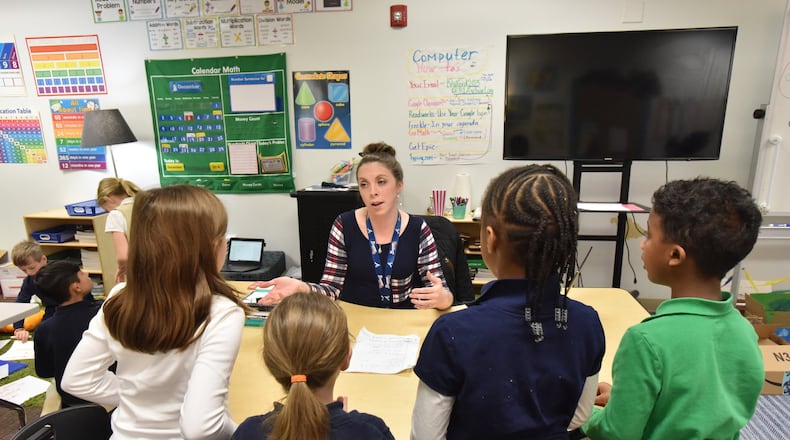Back when the founders of Brookhaven signed the city charter, some viewed its feeder public school system as hopelessly corrupt.
Gov. Nathan Deal had fired more than half of the members of the DeKalb school board, and the superintendent had gone down during a racketeering scandal over school construction contracts. With the district’s accreditation hanging by a thread, it wasn’t long before Brookhaven families had amassed enough signatures on a petition for their own state public charter school.
“We had a crisis going on in DeKalb County and DeKalb County schools,’’ said Brookhaven Councilman Bates Mattison, one of the school’s founders.
The charter school got off to a tough start, though, marred by high staff turnover and lagging test scores. Now, after two years of operations, Brookhaven Innovation Academy is about to hit a major milestone. It has secured up to $12 million in tax-exempt municipal bond financing for construction of a permanent school facility.
“We could not be happier,’’ said Adam Caskey, a real estate attorney who serves as chairman of the board for the school.
However, municipal bond experts, as well as charter advocates themselves, say the financing is by no means a guarantee of success. Many similar projects have gone belly up within the first few years of operations. And Brookhaven’s school doesn’t have long to prove itself.
In Georgia, public charters must convince the state within five years of operations that they can meet academic expectations, among other requirements. Brookhaven leaders learned last week that the school for the first time had met educational standards. It is expected to earn “C” grade, said Bonnie Holliday, executive director of the State Charter Schools Commission of Georgia.
However, for the 2016-17 school year, the school got an “F.”
The Innovation Academy must perform to standards for the next two years. Otherwise, the state can come in and pull its accreditation, triggering an immediate shutdown.
It also needs to continue to convince parents that it’s a good option.
Some DeKalb public schools in Brookhaven outperform the charter school. Ashford Park Elementary earned a 91.6 overall performance rating out of a possible 100, state records show. Kittredge Magnet School, for grades four to six, reported a rating of 98.1.
Caskey said school leaders and board members have worked diligently to study best practices, conduct research and ensure good decision-making. They’ve also tackled problems, such as the poor test scores. Last week’s announcement that the school was among roughly half of 29 state charter schools that had met academic expectations affirms that the work is paying off, he said.
“Part of what we did overall in the last year was really surrounding ourselves and seeking out people who have done this before, experts in the field,’’ Caskey said.
A diverse campus
Advocates for the estimated 7,000 public charter schools in the U.S. say there’s good reason for Brookhaven to celebrate getting the bond financing. In most cases, public charter schools must dip into their limited operating budgets to support capital projects.
"Finding a facility remains one of the major challenges facing charter schools," said Todd Ziebarth, senior vice president for the National Alliance for Public Charter Schools, based in Washington, D.C. "It could be a big deal, I think, if it helps them move into a better facility that could be helpful for the educational program."
At Decide DeKalb, the panel that reviewed Brookhaven's bond application was impressed by the school's commitment to diversity, said Ray Gilley, the development authority's president. It was one of the key factors that drew support, he said.
Brookhaven draws more than 500 students in grades kindergarten through 7 from all over Atlanta to the school’s temporary location on Campus Drive in Norcross. The student population is 45% white, 24.4% African-American, 18% Hispanic, and 4.4% Asian, while 8% are multi-racial and 0.2% are American Indian, state records show. That’s more diverse than some DeKalb public schools in Brookhaven, although the student population in DeKalb school district as a whole is 89% minority.
About 10.4% of the population at the charter school is economically disadvantaged, 10.8% of students have a disability and about 11.6% are English-language learners.
“They are encouraging a diverse student population. It made you really want to help them to be successful,’’ Gilley said.
Before the financing was approved, Gilley said the authority also conducted extensive interviews with Brookhaven’s leaders, and the information that was gleaned during a 90-day application process suggested the school was a good investment.
“We look at what I would say are deals that make sense for capable, competent businesses,” Gilley said.
But Gilley also noted that Decide DeKalb has a limited role in approving the bond financing. As a pass-through agency, the county has nothing to lose if the bonds default. That means investors who buy Brookhaven’s bonds won’t have any assurances that they will get their money back, unlike municipal bonds that are backed by local governments.
“We don’t have anything at risk here,’’ he said.
That’s one of the reasons that some investment firms won’t touch bond deals for charter schools.
"For us, as a firm, we generally don't invest in that sector," said Dean Myerow , a managing director for fixed income trading and sales at NatAlliance Securities LLC, based in New York City. Municipal bond investors want solid revenue streams and consider some of these charter school investments super dicey, he said.
One of the mistakes charters often have made has been to get into facility deals that aren’t sustainable. In many cases, their student enrollments can’t keep pace with their financial obligations, Ziebarth said.
However, Georgia, like a growing number of states, has adopted policies that trigger more dollars to support charters. This past year, state lawmakers approved legislation to provide additional funding for the schools. While charter schools must still be responsible for their own facilities expenses, the state increased state supplement funding, which advocates say improves the chance of success. During the current school year, House Bill 787 triggered more money for teacher pay raises, curriculum, classroom books and technology, according to an official at the Georgia Charter Schools Association.
‘Doesn’t need to be gaudy’
School officials are trying to be prudent with the dollars that have been secured, Caskey said.
They say they will stay within a strict budget for construction of the 50,000 square-foot facility that is expected to have 34 classrooms, a media center, administrative offices, cafeteria and outdoor recreational facilities. The campus is expected to be built on Shallowford Road in Chamblee.
“It needs to be nice,’’ Caskey said of the school building. “It doesn’t need to be gaudy. It just needs to be a solid building that will last.”
Mattison, one of the school’s founders, said he and other parents have been impressed with the school’s focus on personalized learning for every student. Youngsters get to do a lot of hands-on projects, too, he said.
The Brookhaven councilman even decided to pull his now eighth-grade son from a gifted program at Kittredge Magnet School to attend Brookhaven Innovation. His daughter also is a student at the charter school.
Bottom line, he said, when deciding what school to enroll your children, “it’s always got to be a leap of faith for a parent.”
---
Meeting standard
Brookhaven Innovation Academy has a statewide attendance zone, so the State Charter Schools Commission of Georgia compares the school’s performance to that of the state as a whole, not to other public schools in the immediate area.
The academy met the state academic performance standard, according to CCRPI Content Mastery scores data in 2018.
The school’s elementary students scored 68.4 on a 100 point scale, compared to the state average of 65.7. The middle school students scored 65.9 compared to the state average of 65.1.
Content Mastery includes achievement scores in English language arts, mathematics, science and social studies.
(Source: State Charter Schools Commission of Georgia)
Funding woes
The University of Arkansas recently issued a report on the state of funding for public charter schools. "Charter School Funding: (More) Inequity in the city" showed a widening funding gap between traditional public schools and public charter schools in major cities.
Some of the findings:
- The per-pupil disparity in funding between public schools and charters is $5,828, a slight increase over the last two years. The main reason for the gap is that local funding sources favor traditional public schools by on average $7,958 per pupil.
- The gap can't be explained by a higher administrative cost or a higher disadvantaged population.
- The cities with the greatest total funding disparities included Atlanta.
- The funding gap can be eliminated with improved local or state funding, as well as donations. The permanent fix is to develop a consistent student funding formula based on student need.
(Source: National Alliance for Public Charter Schools)
Spotting risk
The tax-exempt revenue bonds that will be sold to fund construction of the new Brookhaven Innovation Academy may offer investors two times the yield of high-quality municipal bonds.
That higher yield reflects the higher risk to investors.
Most high-quality municipal bonds today provide about 4% annual yields. But bonds that are unrated, as the Innovation Academy’s are expected to be, or of lesser quality must pay a higher return to catch the attention of investors.
Adam Caskey, chairman of the school’s board, noted that the bond underwriter did an extensive review of the project. “The bank is going to loan you money to build a school, a significant amount of money, so they’re going to make sure the school is going to be around,” he said. “No lender wants to foreclose on the school … it’s not the easiest thing to get rid of.”
Angela D. Avery, vice president of public finance at the Atlanta-based IFS Securities, which served as the underwriter for the bonds, did not respond to requests for comment.
Investors who purchase Brookhaven's bonds will be represented by a "bondholder representative." In this case, Hamlin Capital Management, an investment management firm in New York City, is the representative, bond documents showed. Bondholders are informed that the bonds are not general obligations of the Developmental Authority of DeKalb County but are special limited obligations, documents show.
About the Author
Keep Reading
The Latest
Featured





